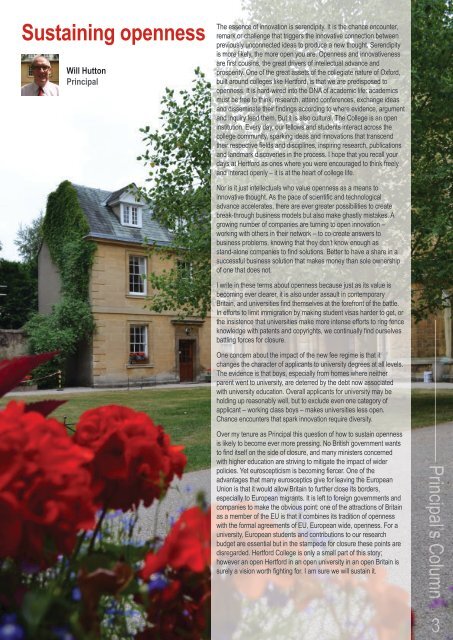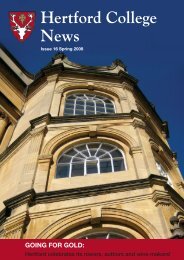Issue 24 - Hertford College - University of Oxford
Issue 24 - Hertford College - University of Oxford
Issue 24 - Hertford College - University of Oxford
- No tags were found...
Create successful ePaper yourself
Turn your PDF publications into a flip-book with our unique Google optimized e-Paper software.
Sustaining openness<br />
Will Hutton<br />
Principal<br />
The essence <strong>of</strong> innovation is serendipity. It is the chance encounter,<br />
remark or challenge that triggers the innovative connection between<br />
previously unconnected ideas to produce a new thought. Serendipity<br />
is more likely, the more open you are. Openness and innovativeness<br />
are first cousins, the great drivers <strong>of</strong> intellectual advance and<br />
prosperity. One <strong>of</strong> the great assets <strong>of</strong> the collegiate nature <strong>of</strong> <strong>Oxford</strong>,<br />
built around colleges like <strong>Hertford</strong>, is that we are predisposed to<br />
openness. It is hard-wired into the DNA <strong>of</strong> academic life: academics<br />
must be free to think, research, attend conferences, exchange ideas<br />
and disseminate their findings according to where evidence, argument<br />
and inquiry lead them. But it is also cultural. The <strong>College</strong> is an open<br />
institution. Every day, our fellows and students interact across the<br />
college community, sparking ideas and innovations that transcend<br />
their respective fields and disciplines, inspiring research, publications<br />
and landmark discoveries in the process. I hope that you recall your<br />
days at <strong>Hertford</strong> as ones where you were encouraged to think freely<br />
and interact openly – it is at the heart <strong>of</strong> college life.<br />
Nor is it just intellectuals who value openness as a means to<br />
innovative thought. As the pace <strong>of</strong> scientific and technological<br />
advance accelerates, there are ever greater possibilities to create<br />
break-through business models but also make ghastly mistakes. A<br />
growing number <strong>of</strong> companies are turning to open innovation –<br />
working with others in their network – to co-create answers to<br />
business problems, knowing that they don’t know enough as<br />
stand-alone companies to find solutions. Better to have a share in a<br />
successful business solution that makes money than sole ownership<br />
<strong>of</strong> one that does not.<br />
I write in these terms about openness because just as its value is<br />
becoming ever clearer, it is also under assault in contemporary<br />
Britain, and universities find themselves at the forefront <strong>of</strong> the battle.<br />
In efforts to limit immigration by making student visas harder to get, or<br />
the insistence that universities make more intense efforts to ring fence<br />
knowledge with patents and copyrights, we continually find ourselves<br />
battling forces for closure.<br />
One concern about the impact <strong>of</strong> the new fee regime is that it<br />
changes the character <strong>of</strong> applicants to university degrees at all levels.<br />
The evidence is that boys, especially from homes where neither<br />
parent went to university, are deterred by the debt now associated<br />
with university education. Overall applicants for university may be<br />
holding up reasonably well, but to exclude even one category <strong>of</strong><br />
applicant – working class boys – makes universities less open.<br />
Chance encounters that spark innovation require diversity.<br />
Over my tenure as Principal this question <strong>of</strong> how to sustain openness<br />
is likely to become ever more pressing. No British government wants<br />
to find itself on the side <strong>of</strong> closure, and many ministers concerned<br />
with higher education are striving to mitigate the impact <strong>of</strong> wider<br />
policies. Yet euroscepticism is becoming fiercer. One <strong>of</strong> the<br />
advantages that many eurosceptics give for leaving the European<br />
Union is that it would allow Britain to further close its borders,<br />
especially to European migrants. It is left to foreign governments and<br />
companies to make the obvious point: one <strong>of</strong> the attractions <strong>of</strong> Britain<br />
as a member <strong>of</strong> the EU is that it combines its tradition <strong>of</strong> openness<br />
with the formal agreements <strong>of</strong> EU, European wide, openness. For a<br />
university, European students and contributions to our research<br />
budget are essential but in the stampede for closure these points are<br />
disregarded. <strong>Hertford</strong> <strong>College</strong> is only a small part <strong>of</strong> this story;<br />
however an open <strong>Hertford</strong> in an open university in an open Britain is<br />
surely a vision worth fighting for. I am sure we will sustain it.<br />
Principal’s Column<br />
3




